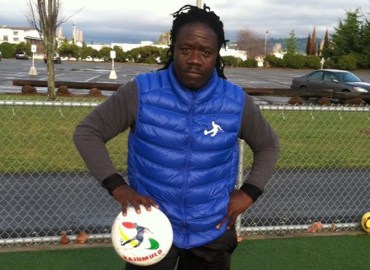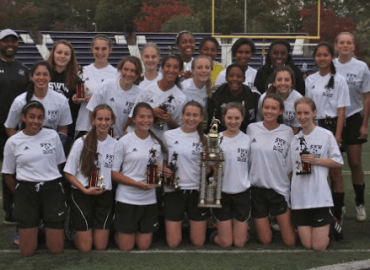White – 7 (88%)
Latin – 1 (12%)
Black – 0 (0%)
Asian – 0 (0%)
Vacancies – 0 (0%)
White – 3 (38%)
Latin – 1 (13%)
Arab – 1 (13%)
Asian – 0 (0%)
Vacancies – 3 (38%)
As the US Men’s National team gears up to begin their search for the next national team coach there are currently no black head coaches in the national team system at either the youth or senior levels. So that begs the question, why isn’t US Soccer reaching out to black coaches throughout the country who have won state, region, or national championships and have developed some of the best US national team players in the history of our sport to become national team head coaches?
To answer this question, I believe that we must first take a look at the leagues that are governed by the federation as well as their leaders. Former US Soccer President Sunil Gulati worked at the New England Revolution before his twelve year stint as President of US Soccer. Don Garber, Major League Soccer (MLS) Commissioner is on the Board of Directors for US Soccer and former Men’s National team player and General Manager of MLS’s Atlanta United FC Carlos Bocanegra also holds a Board of Directors position. So based upon these facts, it is safe to say that MLS’s influence comes from US Soccer and that there are several conflicts of interest.
Of the twenty-three MLS teams there are only nine assistant black coaches. Keep in mind that some MLS teams may carry anywhere between two to four assistants per team. In the league, there is only one black head coach, Patrick Veira of New York City Football Club (NYFC). Veira is internationally recognized for his outstanding career at Arsenal and as a member of the French national team, so when he saw an opportunity to become a head coach in the league, he jumped at the opportunity becoming only the third black head coach in the league’s history after Denis Hamlett and Cobi Jones. Hamlett coached the Chicago Fire to two MLS Cups in 2008 and 2009, and Jones had a brief stint as interim coach of the LA Galaxy in 2008.
In 2015, The Institute for Diversity and Ethics in Sport (TIDES) located on the campus of the University of Central Florida rated the MLS as one of the worse leagues for diversity across all US professional sports. The league has received some of the lowest marks due to its lack of diversity at major positions like Head Coach and General Manager. The number of General Managers have increased marginally with Hamlett currently the Sporting Director of the New York Red Bulls, and Earnie Stewart of the Philadelphia Union who became the first African-American General Manager since the league’s inception in 1996.
In an article written in 2015 by the Orlando Sentinel, a Florida based newspaper, then New York Red Bulls Sporting Director Ali Curtis said, “I think it’s unfortunate, it’s disappointing, it doesn’t represent the diversity within the sport, but I do believe that it’s progressively changing and it’s going to take a little time. First and foremost, executive leadership — from the ownership perspective as well as the [front office] level — needs to acknowledge that diversity does not exist in those areas and that’s a problem. Once you acknowledge that, I think you can start to find solutions in terms of how to address it.”
Three years have passed and very little change has happened in MLS at the decision making levels. In fact, Curtis is no longer in the MLS after developing a 300 page plan to revamp the New York Red Bull making them relevant again in the league. The club became a playoff mainstay during his three years as Sporting Director, and finished first in two of his three years while winning the Supporters’ shield for the best team in the league in 2015.
So what has led to Curtis’s will to work hard, “I was always taught that you have to be twice as good because we didn’t have a whole lot of money and because I was a minority,” Curtis said. “You have to be twice as good and you’ll get your opportunity. That’s kind of the genesis of the engine I have trying to succeed and trying to out-work them and out-smart them and out-strategize just so you can get that one opportunity.” A sentiment that most of us were taught as a principle by our parents but seems to no longer be the case as being twice as good is no longer good enough.
But Hamlett has a different approach to diversity according to the 2015 Orlando Sentinel, “For me, it’s not worth wasting my time on that,” a black man who was born in Costa Rica. “It’s doing the things I can to prepare myself, especially here in New York with Ali and [head coach] Jesse [Marsch]. It’s been a good environment and if we continue to do things right here in New York, people will pay attention to what’s going on and what we’re able to establish and people will take notice.”
US Soccer also financially supports the National Women’s Soccer League (NWSL), a league that ranks statistically worse than MLS when addressing diversity hiring. Of the nine teams in the league, all nine head coaching positions are held by white coaches, and there are only two black assistant coaches with the newly inducted Hall of Famer Briana Scurry being a first year assistant at the Washington Spirit.
I asked three youth soccer coaches with a combine 95 years of experience coaching at the youth level, Myron Garnes, Technical Director of the St. Mary’s Soccer Club in Maryland, Kab Hakim, Director of Coaching at Futsal America, and Lorne Donaldson, Executive President and Director of Coaching at Real Colorado, why aren’t more black soccer coaches being recognized for head coaching positions at the national team level?
Hakim believes that it is due to the lack of diversity in coaching at the higher levels. “Diversity is key for the sport to thrive and grow, so we need more ethnic coaches and players in the game with different ideas and styles.” He believes that the future of the game is decided by the coach and not the player, “if you have the knowledge, education, qualifications, personality, determination, skill and discipline to fulfill a position in the game, then you must put yourself up for the job and keep applying and knocking on that door until someone opens it.” For change to happen, Hakim believes that coaches must “share their own experiences with other members. Don’t just be a taker be a giver. Teach your players, your colleagues about training, nutrition, recovery work, fitness, management, marketing, budgeting, seasonal planning, dealing with parents, fans, media, logistics.”
Donaldson shares similar sentiment to Hakim about the lack of black coaches at the higher levels of US Soccer. “Its ridiculous! When US Soccer thinks of the term soccer and who the minorities in the sport, they think Latin. Therefore opportunities for blacks are far less and it becomes harder to get hired as a black coach.” Donaldson believes that in order to change the perception that of minorities only Latinos play soccer, it is important to target the inner cities for players and invest a portion of the $150 million surplus that US Soccer is currently sitting on to help MLS to increase its 10% of black players currently playing in the league. He believes that futsal in the inner cities would be of great benefit, “we have to find the players and introduce them to the game of both futsal and soccer. We need to also pay the players, and pay them well. Instead of the MLS paying past prime players from Europe $6-$7 million per year, why not pay young US players like Tim Weah or Christian Pulisic that money, this way the kids in the inner cities see that there is money in soccer in the U.S.”
Garnes believes that the reason why US Soccer has not acknowledged black coaches at the highest levels is due to the lack of acknowledgement at the youth soccer level. “Many coaches who won state cup championships in the 1980s and 1990s are not being recognized. Many black coaches have taken players from the grassroots to the academy levels but they are not getting recognized. US Soccer has failed to acknowledge most of the pioneers of the sport who have coached for 30-40 years.” There have been a few black coaches who have been acknowledged by US Soccer but as Garnes states not all have been recognized.
Clyde Watson, McLean Soccer Club’s (Virginia) Technical Director is one of those coaches. In 2015, Watson was inducted into the DC-Virginia Hall of Fame after winning 13 US Youth State Championships, one US Youth National Championship, and in 2007 was named the NSCAA Coach of the Year. Watson has received some accolades but he has never been a head coach at the professional level.
When the Washington Freedom first began play in the now defunct Women’s United Soccer Association (WUSA), Watson remained a long time assistant to current Washington Spirit head coach Jim Gabbara. Despite being an extraordinary communicator, recruiter, and checking all of the boxes to become a head coach, Watson never got his chance.
In 1996, when Donaldson and Phillips recognized the original name Black Soccer Coaches Association under the National Soccer Coaches Association of America (NSCAA), there were only about ten black coaches in 1998 who attended the NSCAA now United Soccer Coaches (USC) Convention. Now there are nearly 750 black soccer coaches in the USC membership system and hundreds if not thousands more throughout the country. So there is no doubt that the talent of black coaches is out there.
To get recognized we must promote the advancement of our own in the game of soccer, which is our mission. One day we will not ask the question as to why US Soccer does not provide black coaches the opportunities to coach at the national team levels, but instead we will see a black man or woman wearing the red, white, and blue on the sidelines leading a team to the World Cup.




